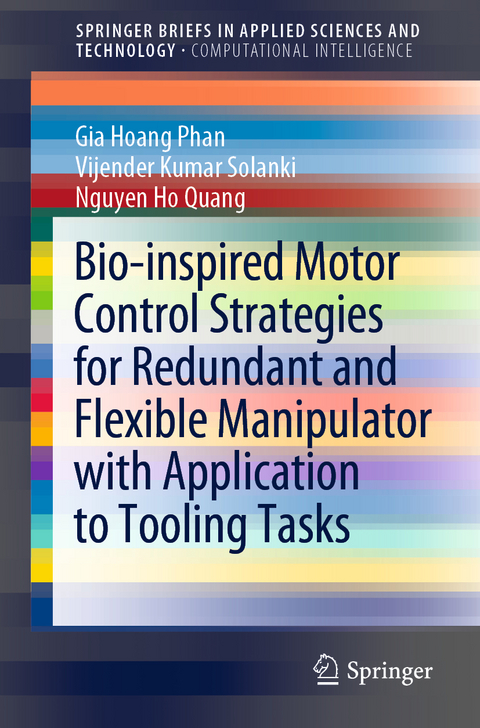
Bio-inspired Motor Control Strategies for Redundant and Flexible Manipulator with Application to Tooling Tasks
Springer Verlag, Singapore
978-981-16-9550-6 (ISBN)
Gia Hoang Phan holds Ph.D. and is Senior Postdoctoral Fellow in Robotics. He received his Ph.D. from the School of Mechanical and Aerospace Engineering, Nanyang Technological University (NTU), Singapore. Broadly, his research interests include investigating methods for rehabilitation and assessment of sensory-motor functions post neurological injuries, understanding and quantifying human strategies during skilled manipulation tasks, and its translation into robotics. He has more than ten years of academic experience in a robotics application, including the analysis of cable-driven robotics, designing and characterization of an instrumented tool, impedance-force control, redundant manipulators, variable stiffness devices, and motion tracker. He used to work as Research Fellow in the production and R&D of Aviation & Aerospace at Rolls-Royce, Singapore, where he programmed control algorithms for the compliant robot (KUKA robot) to operate the finesse finishing tasks on Fan Blade of Turbine engine. In addition, he worked as Postdoctoral in the Department of Mechanical and Aerospace Engineering, Monash University, Australia, where he led projects cooperated with the Royal Melbourne Hospital using medical robotics application for surgery of liver tumors. Currently, he has also worked as Tech Consultant for start-ups and business firms. Vijender Kumar Solanki, Ph.D. is a Dean Research & Development Cell, Associate Professor in the Department of Computer Science & Engineering, CMR Institute of Technology (Autonomous), Hyderabad, TS, India. He has more than 12 years of academic experience in network security, IoT, Big Data, Smart City, and IT. Prior to his current role, he was associated with Apeejay Institute of Technology, Greater Noida, UP, KSRCE (Autonomous) Institution, Tamilnadu, India, and Institute of Technology & Science, Ghaziabad, UP, India. He is a member of ACM and Senior Member IEEE. He has attended an orientation program at UGC-Academic Staff College, the University of Kerala, Thiruvananthapuram, Kerala & Refresher course at Indian Institute of Information Technology, Allahabad, UP, India. He has authored or co-authored more than 75 research articles that are published in various journals, books, and conference proceedings. He has edited or co-edited 25 books and Conference Proceedings in the area of soft computing. He received Ph.D. in Computer Science and Engineering from Anna University, Chennai, India in 2017 and ME, MCA from Maharishi Dayanand University, Rohtak, Haryana, India in 2007 and 2004, respectively, and a bachelor's degree in Science from JLN Government College, Faridabad Haryana, India in 2001. He is the Book Series Editor of Internet of Everything (IoE): Security and Privacy Paradigm, CRC Press, Taylor & Francis Group, USA; Artificial Intelligence (AI): Elementary to Advanced Practices Series, CRC Press, Taylor & Francis Group, USA. He is Editor-in-Chief in International Journal of Machine Learning and Networked Collaborative Engineering (IJMLNCE) ISSN 2581-3242; International Journal of Hyperconnectivity and the Internet of Things (IJHIoT), ISSN 2473-4365, IGI-Global, USA, Co-Editor Ingenieria Solidaria Journal ISSN (2357-6014), Associate Editor in International Journal of Information Retrieval Research (IJIRR), IGI-GLOBAL, USA, ISSN: 2155-6377 | E-ISSN: 2155-6385. He has been a guest editor with IGI-Global, USA, InterScience & Many more publishers. Nguyen Ho Quang holds Ph.D. and is currently Associate Dean and Head of Mechatronics engineering department, Faculty of Technology and Engineering at Thu Dau Mot University (TDMU). He holds a bachelor's degree in Mechanical Engineering from University of Science and Technology, Da Nang University, Vietnam, in 2005. He obtained his M.Sc. degree in Mechanical Engineering from the Thai Nguyen University of Technology, Vietnam, in 2010. In 2017, he received his Ph.D. degree in Biomechanics and Computational Mechanics from University of Technology of Compiègne (UTC), Sorbonnes University, France. And he has also completed postdoctoral fellowships at the Biomechanics and Bioengineering Laboratory, UTC, France. His main research interests relate to computational biomechanics and clinical applications including biomechanics of the musculoskeletal system, patient-specific biomechanical modelling derived from medical images, and rehabilitation engineering.
Chapter 1. Bio – inspired Motor Control Strategies for Redundant Manipulators.- Chapter 2. Bio – inspired Motor Control Strategies: Cable – driven Manipulator using Agonist – Antagonis actuation.- Chapter 3. Design and Control of 2D-Plotter Planar Parallel Robot.- Chapter 4. Combining 3D motion tracker with IMU sensor signals of muscles to discover macro- and micro-vibration for Stroke Rehabilitation.- Chapter 5. A Pneumatic Actuator-Powered Robotic Glove for Hand Rehabilitation.- Chapter 6. Artificial Intelligence in Rehabilitation Evaluation Based Robotic Exoskeletons: A Review.
| Erscheinungsdatum | 04.03.2022 |
|---|---|
| Reihe/Serie | SpringerBriefs in Applied Sciences and Technology | SpringerBriefs in Computational Intelligence |
| Zusatzinfo | 45 Illustrations, color; 25 Illustrations, black and white; X, 91 p. 70 illus., 45 illus. in color. |
| Verlagsort | Singapore |
| Sprache | englisch |
| Maße | 155 x 235 mm |
| Themenwelt | Informatik ► Theorie / Studium ► Künstliche Intelligenz / Robotik |
| Medizin / Pharmazie ► Physiotherapie / Ergotherapie ► Orthopädie | |
| Technik ► Elektrotechnik / Energietechnik | |
| Technik ► Medizintechnik | |
| Schlagworte | Cable Driven Manipulator • Complementary Filter • Haptic Device • Instrumented Device • Non-invasive Surgery • Robotics Rehabilitation |
| ISBN-10 | 981-16-9550-4 / 9811695504 |
| ISBN-13 | 978-981-16-9550-6 / 9789811695506 |
| Zustand | Neuware |
| Haben Sie eine Frage zum Produkt? |
aus dem Bereich


